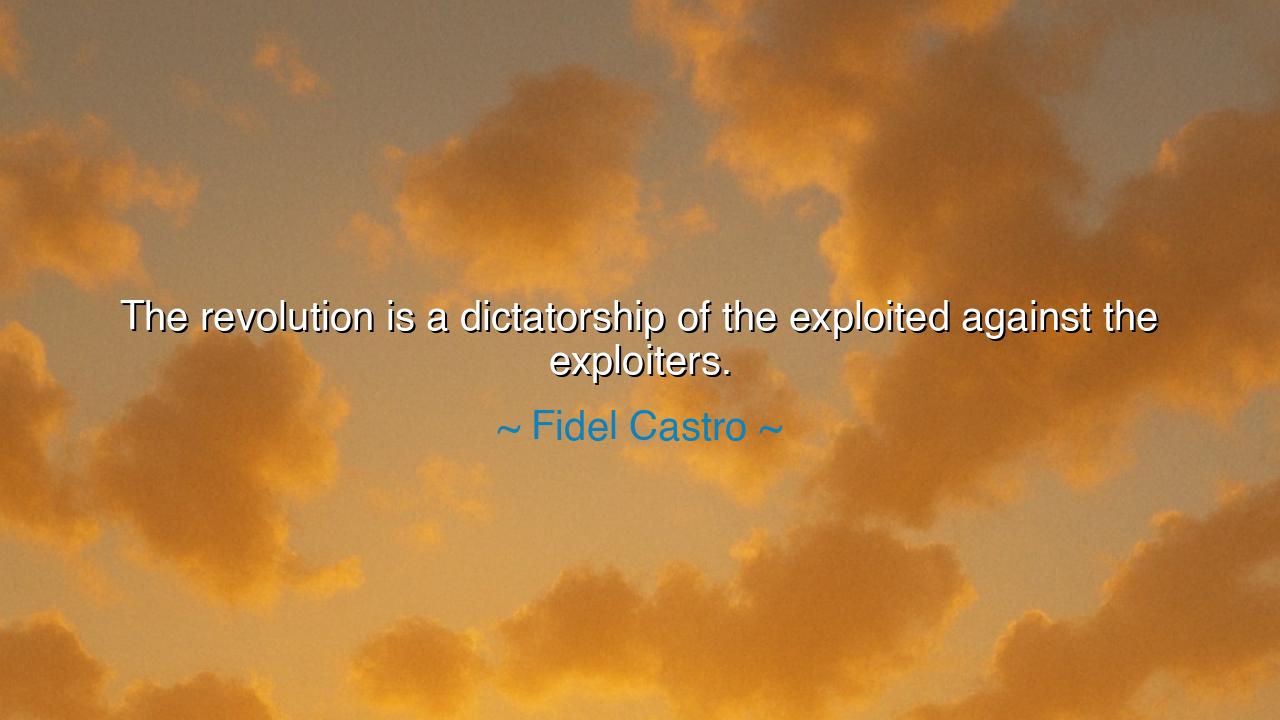
The revolution is a dictatorship of the exploited against the






The words of Fidel Castro, “The revolution is a dictatorship of the exploited against the exploiters,” are born from the fire of struggle and the cry of the oppressed. They reveal that upheaval is not a game of ideals alone, but a reversal of power itself—when those long bound in chains rise to seize command from those who forged the chains. The revolution, in his vision, is not gentle reform but a storm, sweeping aside centuries of privilege to enthrone the dignity of those who toiled in silence.
In the ancient spirit, these words echo the eternal cycle of power. Empires rise by the sweat of the many, yet the fruits are hoarded by the few. When the burden grows too heavy, when hunger and injustice choke the breath of the people, the oppressed erupt like a flood, and the exploiters find themselves cast down. Thus, the dictatorship of the exploited is not tyranny in its birth, but vengeance and redress—a season when the broken claim what was denied.
History bears witness in the story of the French Revolution. For centuries, peasants and commoners bore the crushing weight of taxation, while nobility and clergy feasted in splendor. At last, the starving masses rose, stormed the Bastille, and turned their fury against their rulers. For a time, the exploited became the arbiters of fate, a mirror of Castro’s words. The revolution was not delicate justice, but a rough and bloody balancing of scales.
Yet, in his saying lies also a warning: when the dictatorship of the oppressed arises, it too may grow harsh, for pain often begets pain. Those who once sought freedom may wield their power with a heavy hand, for the memory of suffering burns deep. Thus, Castro’s words carry both hope and peril—hope that the exploited may at last claim justice, and peril that their rule may repeat the cruelty of their former masters.
So let this truth endure: the revolution is the cry of the oppressed when no other remedy remains. It is the fire that consumes injustice, but also the fire that can scorch all in its path. To honor its spirit is to heed its cause before it comes to flames—to lift the exploited without waiting for them to seize power in wrath. For when the day arrives that the many rise against the few, the world itself is remade, and the lesson of history is carved once more in blood and stone.






HLVu Ha Lam
Fidel Castro’s view on revolution offers an interesting take on how the oppressed can rise against their exploiters, but it also raises a key concern: by establishing a dictatorship, aren’t you simply replacing one form of power with another? Is there a way to achieve meaningful change without resorting to authoritarian rule, or does the revolution inevitably lead to this kind of structure?
TNThoai Ngo
This quote speaks to the complexity of revolutions and their potential to be both liberating and oppressive. Castro's view implies that revolution may require a strong, centralized power to overturn established systems, but does that make it just another form of authoritarianism? Can any revolution truly escape the pitfalls of power, or is dictatorship an unavoidable byproduct of societal upheaval?
HDhuynh dan
The idea that a revolution is a dictatorship of the exploited is intriguing, but it also suggests a dangerous paradox. If the goal of a revolution is to end exploitation, how do we reconcile that with the imposition of a new form of control? Are the exploited truly liberated if they are simply replaced by a new class of rulers who act with similar authority?
DPLe Duy Phuc
Castro’s statement challenges the traditional notion of revolution as a democratic force. If a revolution results in a dictatorship of the exploited, what happens to the ideals of freedom and equality that typically accompany such movements? Is it possible for revolutionaries to break free from the cycle of power consolidation and control, or is dictatorship an inevitable outcome of any power shift?
AVAnh Van
This quote paints a stark picture of the dynamics between the oppressed and their oppressors. Castro’s perspective seems to suggest that revolution, by its nature, must be confrontational and authoritarian to succeed. But does this raise questions about the ethical implications of using authoritarian power to fight exploitation? Can a revolution ever truly achieve freedom if it perpetuates some form of dictatorship?